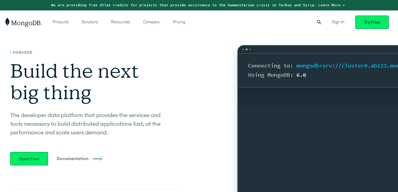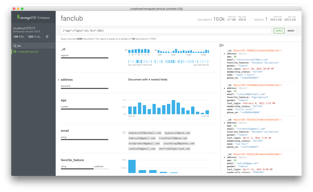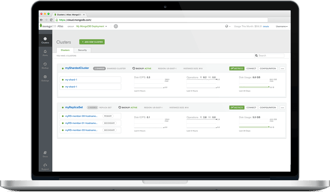

Unclaimed: Are are working at MongoDB ?
MongoDB Reviews & Product Details
MongoDB is a NoSQL database that supports scalable, and high-performance data storage solutions. The platform’s automatic sharing features combined with real-time analytics and horizontal scalability empower businesses with efficient data management.

| Capabilities |
API
CLI
OSS
|
|---|---|
| Segment |
Small Business
Mid Market
Enterprise
|
| Deployment | Cloud / SaaS / Web-Based, Desktop Mac, On-Premise Linux, On-Premise Windows |
| Training | Documentation |
| Languages | English |




Compare MongoDB with other popular tools in the same category.

It works on Mac OS, Windows, and Linux. It is pretty easy to install and run the server with the console or terminal. About MongoDB and NoSQL, it is a big and tested platform with a big community of developers, I love the scalability of each document and the schema design concepts that I learned in MongoDB University. All the documents are JSON, If you're familiar with JavaScript language it will be easy to adapt to MongoDB. It is a robust platform, it provides you with replicas set and shared databases so you can scale your app fast and nice. I have MongoDB installed in my Linux Kubuntu 15.10 Laptop and my Windows 10 PC, I have used it with MEAN Stack in an angular.js course I took in Pluralsight, with Spark Java Framework I developed the simple blog system that you do in the MongoDB University Courses, and Meteor.js platform and a Coursera Web Design Specialization I am taking right now where we use Meteor.js to create collaborative reactive apps, we develop a voting web apps system, a doc editing system, a portfolio with a blog, a music app, a drawing app, and finally, I am developing my Capstone Project where I am going to use MongoDB for its scalabilities opportunities. My personal portfolio has MongoDB as Database for the blog, be my guests http://corderogerardo.me.
Well it is not I dislike, it is more a take care when you as a Linux user were installing MongoDB, it is good that you learn first how to use your terminal, all the commands you need to create folders and give permission when you need it, I am saying this because you may have problems starting, because you need to open two consoles or terminals, and in one you need to write and enter mongod to start the server and in the other mongo to start the MongoDB shell, then when you finish you need to stop first the mongo shell and after the server.
Fast scaling and easy use, for what I need when I was developing my portfolio and know for my Capstone final Project I want a different version to test how the system operates within a lot of users.
schemaless database, document database, fantastic to scale out. great management of replica set and sharding...i love it. Nested document and index creation, it's fantastic the power of this database. It's great that you can evolve your database simply adding tags/values/elements in your newest json records; don't worry about tables structure and so on. Please consider that there's alsa a mongodb university, with free online courses for developers (.net, python) and dba. what else?
nothing, at the moment. really, I'm using it from four months and i've never had a problem with it. Only i'm having some trouble managing a lot of windows shell, but, hey we're dba, not interface designer, right?
we're testing it for a transactional database (schemaless). moving from a sql server classic relational database storing xml data type (too slow for our porpouse) to a json database. easy to administrate and
The native map reduce tools have "cut the fluff" and let my solution to another level, without having to count on many different third party tools. It's as simple as creating a prototypic script.
I wish I could use a native GUI tool whereby I could rely on. Free open-sourced tools are not optimal, whilst one specific solution has one good feature, it may lack another just as important one. Paid solutions are great ones, but many times expensive ones too.
I've been dealing with a heavy load of data whereby a big data kind of solution is being built. While trying with many other relational databases, I have felt the lack of native support to perform simple BI tasks, such as the aforementioned map reduce feature. Now, by using MongoDB, I have been able to create on-the-fly BI Cubes as simple as creating a quick script.
A very robust and full featured non-relational database. The documentation is excellent and there are numerous different resources available to accommodate your learning style. Integration with Spring is excellent and easy.
It's use is definitely situational. Document size is limited. It is not a silver bullet. It is a great database is you want performance and json like interactions. It is still young and growing and it's feature set is volatile. Overall not a lot of dislikes, just things you have to remember about the application of a non-relational document database.
Data integration between two platforms. It is fast and easy to use with Spring Boot. Most of the interactions with Mongo are simple and handled by Spring.
The east startup, from the moment you start up to the point where you have a running application is a matter of minutes. Once the initial steps are done it can be easily scale up in a matter of seconds with no extra effort. It is easy to connect from multiple applications and drivers. It is part of the MEAN stack for a reason
It still does not have the throughput of some of the commercial products such as cassandra, however it is much more easy to debug and understand the workflows
1. The ease of scaling up when handling large volumes of information 2. The encryption system helps when handling with HIPAA compliance
Recently I was very impressed by NoSQL databases and especially Mongo. In modern world if you think about document oriented database - i'm pretty sure that you will think about Mongo first. Javascript as internal language, flexible indexes, full text search, clusterization from the box - all this features in my own mind made Mongo one of the best NoSQL databases. Ofcourse we should not forget about big communitu and a lot of official language bindings.
My projects use cyrrilic set of characters (Russian) and Full Test Search engine not so good for that. Clusterization for leader election requires at least 3 node,
In my projects I have a lot of unstructured documents - and I need fast search and store engine for them.
Besides the obvious benefits of scalability, performance, and being open source, what I like best about MongoDB is it's ease of use and simplicity. Getting MongoDB up and running literally takes only a couple of seconds. And in particular if you are working in a shop using CD/CI processes, MongoDB fits extremly well. At our shop I think nobody would ever consider going back to a SQL based persistence layer. To summarize: - scalibility - performance - stability - simplicity - functionality - flexibility - open source - popularity
Though adopting MongoDB can provide tremendous advantages, switching to a schemaless paradigm also can have it's challenges. Keeping your data clean can become very difficult and shouldn't be underestimated. Secondly, not having any join functionality can make certain tasks very cumbersome. That's why I can't wait start using MongoDB 3.2 with Document Validation and $lookup.
MongoDB allowed our engineering team to build a web application that horizontally scales with the business.
In the production environment, MongoDB provides an easy to use, easy to understand, yet powerful and reliable replication model to protect corporate data. Replication strategies can be quickly set up and tested in a number of ways, from a single development machine up to a full blown cloud solution. As the volume of your data grows, sharding is easy to set up and maintain. Capped collections and time to live indexes give you powerful tools to limit how much data you maintain. The document model allows developers to rapidly prototype data models and freedom from a rigid schema allows painless changes to the data layer as business needs evolve.
While the time to get a new developer productive in MongoDB is short, it takes extra time to get a developer with a SQL background to rethink their design patterns.
We deal with a lot of disparate data sources. JSON documents allow flexibility in accepting the data from external sources without strictly enforcing a lot of "heavy handed" rules. With MongoDB, we are able to quickly ingest the data then adapt rules to make best use of the the data.
When I was working on a project related to a documentation system, MongoDb is my best choice for this system, the original target of a no-sql database fits the system pretty good. Except for the database itself, the speed and the flexibility are other two attractions for me. MongoDb quires can be very fast in most of the cases I am working on. and especially in the case you want to retrieve the data in a single lookup. The design of query is pretty good, especially for a system like ours, queries data through documentation systems, not sql query as a traditional database.
For a person who worked on the SQL database, without join statement is kindly hard to think about the database. There are no possibility for an engineer for use join in MongoDB, we need to make multiple queries and join the result together for our own target. Another thing I dislike mongdb is the memories usage in the database system, some time the system uses a huge block of memories that let the system almost slower the it should be, if the developers can fast the speed and optimize the memories, it would be better. For the concurrency issue, the mongoDB is also not doing good, it should be better for persons where high frequency is required in a database system.
The problem we are soling is trying to save daily information and data so that people can loop up at any time, the system need to have a huge database along the time goes fly. save data as a documentation that's why we are using mongoDB .
It's a solid document store with good performance. I enjoy the robust operators, benefit greatly from the mature ecosystem, and have my butt saved every now and then by the built-in mapreduce & aggregation framework.
The only thing I dislike is that they quickly develop great functionality, and I'm hesitant to upgrade my database in production to immediately take advantage of it. A safer and/or more fool-proof way to upgrade (and rollback) databases would be awesome.
We use MongoDB for everything, and we would probably be just as well off with a SQL database, but I really enjoy the flexibility of the embedded documents and deep indexes.
